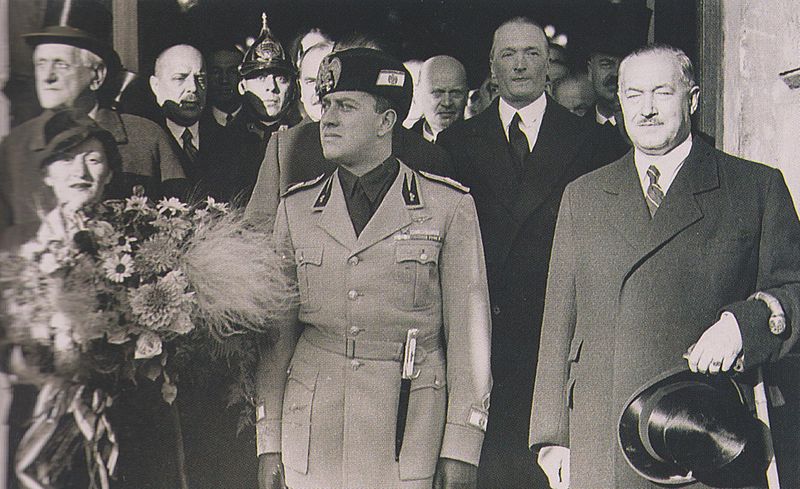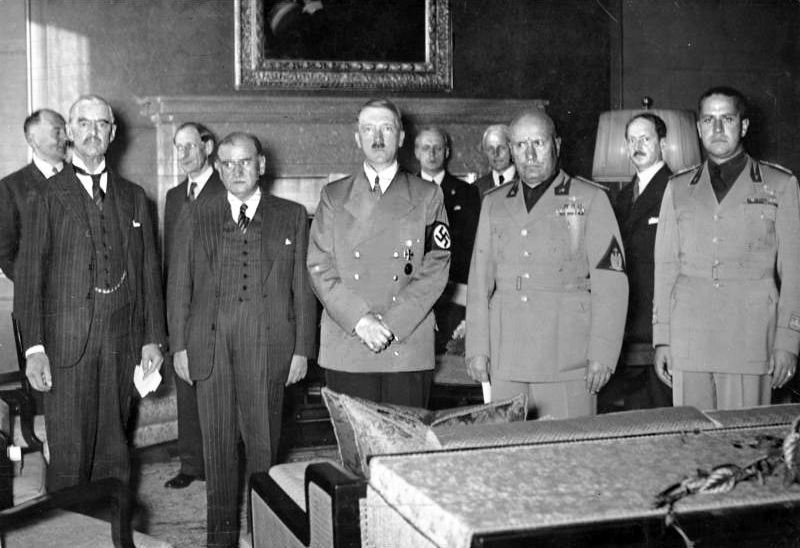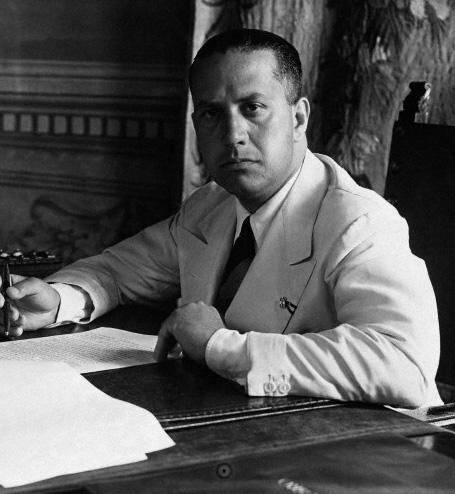When Benito Mussolini (1883-1945), otherwise known as “Il Duce”, ruled Italy as a Fascist dictator in the years leading up to the second World War, one of the more benign privileges he enjoyed was being able to create government positions. He was also able to appoint whoever he wanted to those positions.
Il Duce was already ruling Italy by utilizing fear and violence, when his daughter Edda (1910-1995) married lifelong fascist Galeazzo Ciano (1903-1944) in 1930. Like many dictators, Mussolini trusted the loyalty of family members over outsiders. In 1933, he appointed his son-in-law Ciano as Head of the Government Press Office. In 1934 Ciano was appointed as the newly created Undersecretary for Press and Propaganda, but only until 1935 when he was named as the newly created Minister of Press and Propaganda.

Prime Minister Kálmán Darányi and Foreign Minister Kálmán Kánya greets Italian Foreign Minister Galeazzo Ciano and his wife Edda Mussolini on 13 November 1936. Photo via Wikimedia Commons
Ciano left that position later that same year to volunteer for military action when Italy invaded Ethiopia. He was the dictator’s son-in-law, so obviously he did not start his military “career” cleaning latrines as a Private. After receiving a couple of medals for valor, he returned to Italy in 1936 and was appointed to take over his father-in-law’s position as Minister of Foreign Affairs.
In the late 1930s, Mussolini allied with another authoritarian leader, Adolf Hitler (1889-1945), in Germany. World War II began when Hitler invaded Poland in 1939, causing Great Britain and France to declare war on Germany. It turns out that wasn’t an equal partnership and in January 1943 Ciano urged his father-in-law to break with Germany and seek terms with the Allies.

Ciano (far right) meeting with Neville Chamberlain, Adolf Hitler, Benito Mussolini and others. Photo via Wikimedia Commons, Attribution: Bundesarchiv, Bild 183-R69173 / CC-BY-SA 3.0
Alas, with some people loyalty only works in one direction. In February 1943 Mussolini fired his entire cabinet, including Ciano, who became an envoy to the Vatican. In July 1943, Ciano voted against his father-in-law continuing as the head of government. With enough votes to oust Mussolini, Italian King Victor Emmanuel III dismissed Mussolini and had him arrested.
In August, Ciano and his immediate family fled to Germany, fearing they would be arrested in Italy. In September, Hitler had Mussolini rescued and set him up as the head of a new Fascist state in northern Italy, which was propped up by Germany. Germany sent Ciano back to work with his father-in-law, but when Ciano got there, he was arrested for treason for his July vote against Mussolini.

Count Galeazzo Ciano, Mussolini’s foreign minster and son-in-law at his desk in Palazzo Chigi, Rome in 1937. Photo via Wikimedia Commons
Although Edda begged her father to spare her husband’s life, Ciano was executed by a firing squad in January 1944. She had escaped to Switzerland a couple of days before her husband’s death, and never forgave her father. Mussolini died a little more than a year after Ciano.
One last thing. Ciano kept diaries, but not diaries about his personal life. He wrote about government meetings. He wrote about what was said and about his opinions. I haven’t read the published diaries, but apparently he shared some not-very-nice things about Hitler. Edda tried to use the threat of the contents of the diaries to save her husband, but like her pleas to her father, it didn’t work. She had those diaries published after the war, and they are are great primary source for historians.
So there you go. Nepotism practiced because of a belief in the trust and loyalty of family, which ultimately was shown not to exist on either side.
